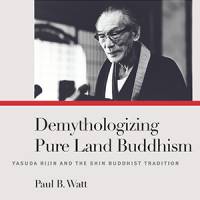The bulk of "Demythologizing Pure Land Buddhism" is a collection of essays by Rijin Yasuda (1900-1982), a Shin Buddhist thinker in the modernizing tradition of Kiyozawa Manshi (1863-1903). Yasuda "taught a conception of Amida and the Pure Land that made them existential realities in the present," as translator Paul B. Watt puts it in his introduction: The Pure Land for Yasuda was not a cosmic bliss dimension but rather "that place where sentient beings discover their true identity as the Tathagata."
Demythologizing Pure Land Buddhism, by Paul B. Watt
196 pages
UNIVERSITY OF HAWAI'I PRESS, Nonfiction.
Watt's readable and wide-ranging introduction does not assume any familiarity with Shin Buddhist theology, but the essays are a different story. These essays were written for an audience of students and intellectuals, and the influence of Heidegger and other German thinkers on Yasuda's thought, both directly and via the philosophers of Kyoto school, is palpable (not least because Watt makes a point of leaving German words in the original untranslated, albeit end-noted). A single sentence might borrow from two or three other languages: "The realm of dharma-nature that is the adornment of the mind of aspiration is also the name as the fact of wirklich."
This is not to fault the translation, however. The dense, methodical texture is, as Watt intended, a faithful recreation of the style of the originals essays, right down to Yasuda's page-long paragraphs. For those with an interest in modern Shin Buddhist thought, Yasuda's bracing humanism might well justify the demands of the form.

















With your current subscription plan you can comment on stories. However, before writing your first comment, please create a display name in the Profile section of your subscriber account page.